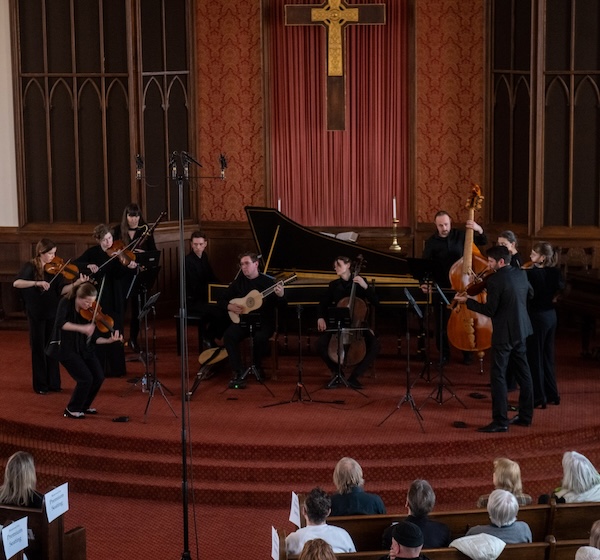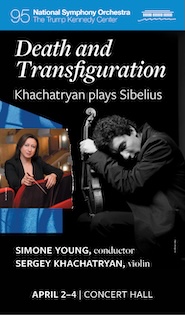Performances
Baritone Kelsey returns to Vocal Arts DC for a masterful night of English song
Quinn Kelsey made his Washington debut in 2007, under the aegis […]
Sibelius takes flight under Robertson, while double concerto premiere lands with a thud
Trust David Robertson to handle a world premiere. The American conductor, […]
NSO celebrates America as the Kennedy Center’s closing looms on the horizon
As July 4 approaches, presenters and ensembles around the federal city […]
Exquisite moments from Beilman and Osborne at Library of Congress
Composers in the romantic period embraced the new capabilities of the […]
Friday the 13th brings good luck with Voyager Ensemble’s bracing program
Arnold Schoenberg may be the most famously triskaidekaphobic composer, but George […]
Articles
Independence must be restored to the Kennedy Center in order to save it
When President Trump conducted a partisan takeover of the Kennedy Center […]
Top Ten Performances of 2025
1. Chamber music for strings and piano. Wu Han/Chamber Music Society […]
Concert review
Relic vividly recreates Homer’s “Odyssey” in words and music

Relic performed “The Odyssey” Sunday at Capitol Hill Presbyterian Church. Photo: Don Lassell
It’s rare when a concert moves outside the box, offering something you’ve never quite experienced previously. That was the sense this listener had Sunday evening listening to Relic expertly perform a program titled “The Odyssey,” after Homer’s ancient epic of the same name, at Capitol Hill Presbyterian Church.
The 11 members of the period-instrument group combined elements of music, drama and literature in this unique presentation. Relic’s cellist, Cullen O’Neil, expertly curated the musical excerpts as well as other selections from the late-Renaissance and Baroque periods, matching them with eight short passages from Homer’s text (using Robert Fagles’ 1996 translation).
To avoid any longueurs, O’Neil supplemented selections from the 16 composers with what she described as “Handelian chords,” which played below a narrator’s brief readings, for an introductory recitative that announced each of eight episodes in Odysseus’ journey home to Ithaca after the Trojan War.
If this sounds like a lot, it was. With Relic taking just a second or two between musical selections, audience members had to leaf quickly back and forth in the program looking for the episodes’ composers and the accompanying text. Listing the compositions and Homer’s text together would have helped, though this is a quibble.
The quick pace and mostly brisk selections let Relic recreate high points of Odysseus’ 10-year homeward saga in a fast-paced 50 minutes. Besides the energetic tempi, credit also goes to O’Neil’s text excerpts, which were deliberately brief, introducing each segment instead of diving into detail.
Violinist Rebecca Nelson took on the additional job of performing Homer’s text, which she did with the right amount of drama, as shown in the first episode as she introduced the cyclops Polyphemus, which “devoured” two of Odysseus’ men, “entrails and all, leaving no scraps!” she growled. Relic followed her words immediately with an appropriate excerpt, from Polifeo, a 1735 opera about the one-eyed creature, by Nicola Porpora.
Nelson also shone later when describing the sorceress Circe, who initially charms Odysseus’ men and later turns them into pigs, “… grunting and squealing. ‘Off to your sty!’ she cried, ‘and wallow with your friends!’”
Here Relic offered musical selections describing various aspects of Circe. For her enchanting side, the group performed a pair of gorgeous sinfonias from Ulisse nell’isola di Circe (Odysseus on the Island of Circe), a 1650 opera by Giuseppe Zamponi. The multi-talented Nelson, who’s also a composer, added to the sweet portrait of Circe with her arrangement of Girolamo Frescobaldi’s 1630 madrigal, Se l’aura spira tutta vezzosa (If the breeze blows all charmingly). Representing Circe’s more sinister side was Nelson’s arrangement of Récit d’ Alcine (Alcine’s Tale) from 1617 by Pierre Guédron, which describes the intensity of another sorceress, Alcina.
The musical close of Circe’s episode, one of longest of the eight, was a lively Allegro from the Overture to Handel’s 1730 comic opera Partenope, a nod to the amusing difficulty the men had walking on pigs’ feet.
While the early part of the program emphasized fine solo playing from violinist Toma Iliev, the Handel showcased Relic’s airtight ensemble, with unison lines for the strings played with accuracy and speed, though without sacrificing intonation or phrasing.
Another plus was the diversity of composers that O’Neil chose, which allowed Relic to display its surety with late-baroque compositions, including Bach’s cantata, Ich habe genug, BWV 82, during “The Enchanted Sleep” section of the program, where Athena puts Odysseus into a deep slumber. O’Neil adapted the aria “Schlummert ein, ihr matten Augen” (Fall into Slumber), to feature herself on cello. The result was arguably the evening’s most beautiful moment, a reminder of how talented players can help erase the notion of Bach’s music as cold and didactic.
After a few minutes, it was clear Relic also considered the visual aspects of its performance. As such, violin soloists moved to various spots on stage, presenting different looks, but also emphasizing that several of its players are world-class soloists. In addition to Iliev, Aniela Eddy produced a smooth sonority, while Natalie Rose Kress displayed enviable virtuosity, ripping through 16th-note scales and arpeggios in an Allegro from Arcangelo Corelli’s Concerto Grosso in F Major to finish Odysseus’ journey with a flourish, which was greeted by loud applause from the audience.
Relic will repeat “The Odyssey” during a week-long tour of Louisiana and Texas beginning March 4. relicensemble.org
Calendar
March 5
Villa Albertine
Duo Ingolfsson-Stoupel
Dubois: Violin Sonata
Chausson: […]
News
Trump plans to shutter Kennedy Center for two years, causing upheaval for NSO, others
In a surprise announcement Sunday evening, President Trump declared that he […]
Washington Classical Review wants you!
Washington Classical Review is looking for concert reviewers in the DC […]




